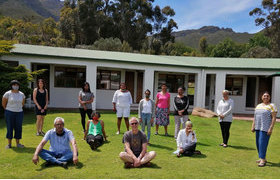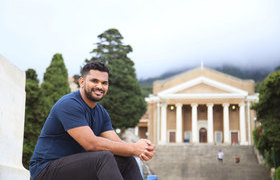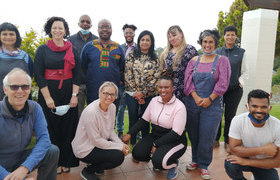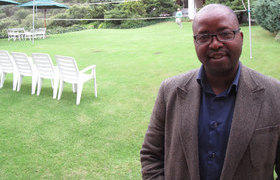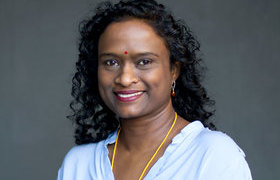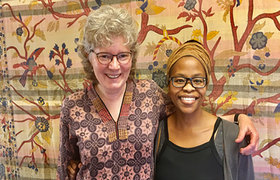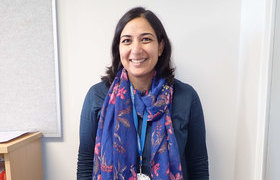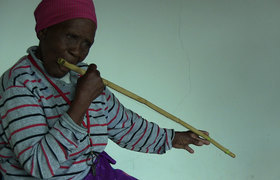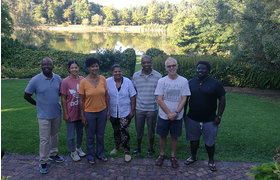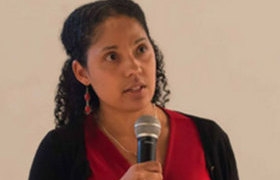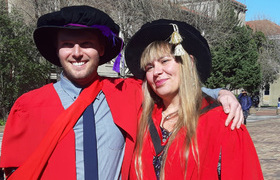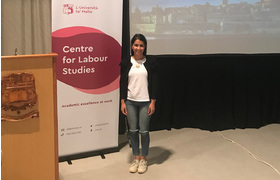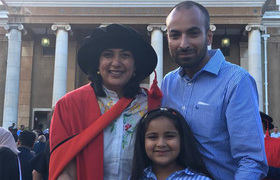Phumla Sinxadi – from Zwelethemba through Mokhesi to UCT
04 November 2021 | Story Robert Morrell. Photo Supplied. Read time 6 min.
Phumla Sinxadi is the head of the Division of Clinical Pharmacology in the Department of Medicine in the University of Cape Town’s (UCT) Faculty of Health Sciences. She was born in Zwelethemba, Worcester where she started her schooling. She then moved to Mokhesi Village, in Sterkspruit in the Eastern Cape. Here she lived with her maternal grandmother. It was her grandmother who encouraged Phumla along the road to academic excellence and leadership.
Phumla grew up in an extended family, together with siblings and cousins. Her grandmother, Maletsopa Sinxadi, wanted to be a teacher and placed great value on education. She felt especially passionate about educating girls, as she couldn’t finish her own schooling. Her father refused to pay school fees. He didn’t want to invest money “on someone who would marry and go off and live with another family”.
Phumla’s grandmother dropped out of school just two years before achieving her dream of advancing on the road to becoming a teacher. This disappointment fueled her resolve to encourage her children and grandchildren to make the most of the opportunities to further their education.
Phumla grew up revering education and being rewarded for success. “Getting a reward, such as small change to buy a treat in school or having a chicken slaughtered in your honour, for excelling in school, was something I always looked forward to”.
Phumla’s schools lacked basic infrastructure, such as running water or libraries. Nevertheless, “I had teachers that took pride in producing the best and it was commonplace to hear that I must become a doctor”. Phumla’s mother and two of her aunts were nurses. “I guess I was destined to be a healthcare worker.”
“I came to medicine via the lens of social justice and not the other way around.”
The road to leadership
Many factors combined to teach Phumla independence. “I went to boarding school at age 14. In addition, my mother sadly passed away when I was a medical intern. That helped me learn to think independently, while cherishing my close family relationships – particularly with my grandmother.”
When she got to UCT, Phumla found herself surrounded by good leadership role models which helped her to become the first black South African medical specialist in clinical pharmacology. But the decisive input insofar as leadership went, came from Professor Bongani Mayosi. “My taking up of any kind of an academic leadership role only grew when I was inspired to think big by the late, great Professor Bongani Mayosi.”
Phumla was a founder member in the Next Generation Professoriate (NGP). Here she learnt a lot about UCT and its systems. “The baseline assessment was an eye opener and that made me wish I had known about the system at the beginning of my postgraduate training. That way, I would have known to pay attention to all four legs of the performance indicator system at UCT (teaching, research, leadership and management, and social responsiveness).“
Becoming a leader at UCT
Phumla values the time that she has spent doing work on UCT’s committees. “The real challenge with the system is trying to balance the teaching and research responsibilities with the demands on time required to sit in meetings after ensuring that you are prepared enough to make meaningful contributions.” There is a problem, she believes, with how committee work is valued and counted. “The performance indicator system is biased towards counting the number of committees the staff member sits on, rather than the meaningful contribution they bring as individuals.”
Phumla is a course convenor for pharmacology and internal medicine (Nelson Mandela Fidel Castro medical program) courses. She is active in a few departmental and faculty committees and is a director for the South African Society for Basic and Clinical Pharmacology, the South African Clinician Scientists’ Society and Pharmacometrics Africa.
The NGP was also an important rung on the ladder to leadership. It was a “very supportive nest where the joys and challenges of emerging as an academic scholar could be shared, and lessons learnt across the many disciplines and faculties included in this programme”. It also provided a “protected space” for academic writing that is essential but, she added, difficult and “easy to keep avoiding!”. Phumla found the NGP to be “a uniquely safe space” where ideas could be challenged and limits stretched. “Rob has a (mostly good) habit of asking probing questions.”
Being a mum and an academic
Phumla became a mother to her daughter, Maya, three years ago. She sometimes thinks this is her greatest achievement! “At my graduations and with my other achievements, my dear grandmother always said that they were good but that the thing that really counts would be to become a mother.” Despite being a single working mother, Phumla feels fulfilled. “I feel like I have the best of both worlds – a stimulating career and a home filled with love, laughter and learning.”
But work and family has for nearly two years happened under the cloud of the COVID-19 pandemic. “It has been very hard on all of us – the lockdowns, working from home, and having to teach in a virtual environment.” In the Faculty of Health Sciences the need for clinical service placed an additional heavy burden. “I really hope vaccination uptake increases rapidly so that the fourth wave can be manageable. At the same time, we have learnt so much – particularly how important face-to-face interactions are particularly for clinical teaching and student support.”
 This work is licensed under a Creative Commons Attribution-NoDerivatives 4.0 International License.
This work is licensed under a Creative Commons Attribution-NoDerivatives 4.0 International License.
Please view the republishing articles page for more information.
Next Generation Professoriate (NGP)
The Next Generation Professoriate (NGP) is a mid-career academic staff development and support programme. Funded by the vice-chancellor’s Strategic Funds, the NGP addresses demographic inequalities in the academic hierarchy. The goal is to help members become associate and full professors.
The NGP was officially launched in September 2015. By the end of 2018, four of its members had been promoted to full professor and a further 14 had reached the rank of associate professor.
The programme is led by Dr Robert Morrell, who has over 35 years of academic experience in South African universities. He has a B1-rating from the the National Research Foundation (NRF) and is an elected member of the Academy of Sciences in South Africa.
Newsletters
In the news

